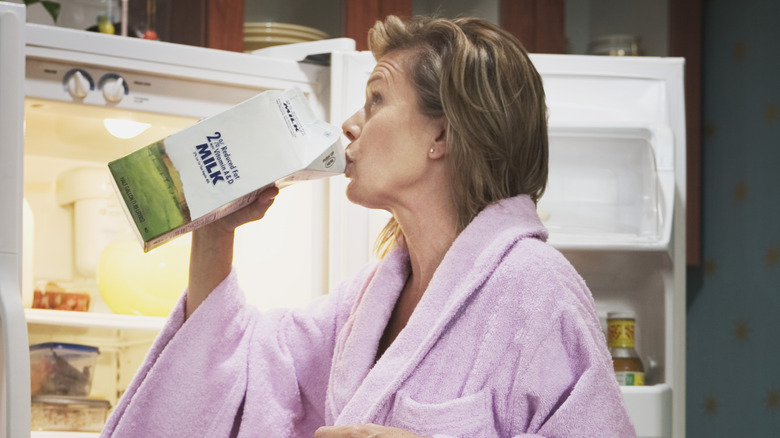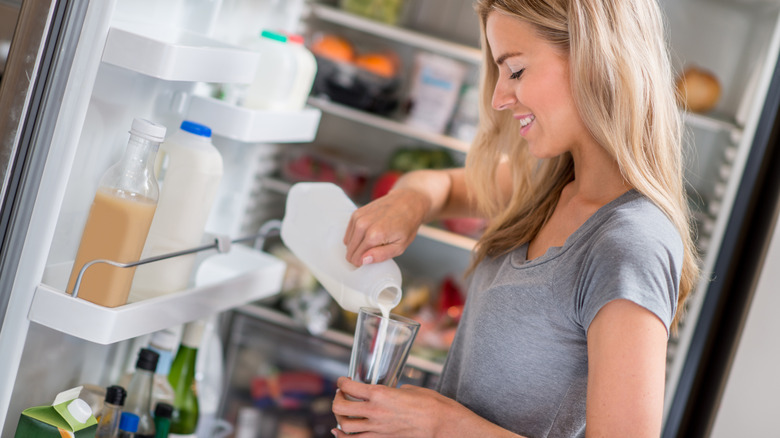Sipping Directly From The Milk Carton Actually Makes It Spoil Faster
It's late, past midnight, and you suddenly wake up craving a sip of milk. You stumble downstairs into the kitchen, open the fridge, and see it — a fresh carton of milk. It's exactly what you need. Though you consider grabbing a cup, you decide to simply open the carton and take a sip. While this might seem innocent enough, and many of us have probably taken a swig from the milk carton at some point, did you know this habit could be causing your milk to spoil faster?
That's right: Regardless of how careful you are to prevent backwash, the human mouth naturally contains bacteria and microbes that can cause bacterial contamination, leading to premature spoilage. Moreover, even when storing milk at the correct temperature in the fridge, many microbes can thrive in cool conditions.
Furthermore, if you're sick, backwash becomes an even more significant concern. According to the Centers for Disease Control and Prevention, norovirus can be transmitted through food and drink, including milk. So, the next time you're tempted to chug from the jug, remember the potential health risks that small act could entail.
Keeping your milk fresher for longer
To ensure your milk stays fresh, proper storage is key. Milk should always be kept in the refrigerator at an optimal temperature of 37 degrees Fahrenheit. Storing it on a lower shelf towards the back helps maintain a consistently cold temperature. Therefore, it's advisable to avoid placing milk in the fridge door, where it may be subjected to warmer temperatures and shifts in temperature, increasing the risk of spoilage.
But even under the best circumstances, milk typically remains good for about seven days. If you wish to extend its shelf life, consider freezing your milk. Milk can last up to six months in the freezer, though it's optimal to use it within one month. When thawing frozen milk, do so in the refrigerator rather than at room temperature to prevent spoilage. Be aware that thawed milk might develop an unpleasant, grainy texture. This can be fixed by shaking the milk, or blending it to achieve a more homogenized texture.
Regardless of how you store your milk, safety should always be a priority. Pay attention to the milk's expiration date, and ensure it remains uncontaminated and stored at a safe temperature.
Leftover safety
Milk is not the only food that can be spoiled by consuming it directly from the container. Double dipping, often considered a social faux pas, can also pose a food safety hazard. A 2009 study published in the "Journal of Food Safety" examined the effects of double dipping, and found that it can contribute to the spread of foodborne illnesses. This means that consuming food directly from a container, especially when exposing it to bacteria from your mouth, can cause the food to spoil before its expiration date, and potentially become a source of contagion.
Therefore, it's important to follow food safety protocols, particularly with leftovers. Separate and properly label leftovers to reduce the risk of consuming someone else's food. Additionally, regular hand washing, using clean containers and equipment when handling food, and making sure not to reheat leftovers more than once are crucial practices. While these steps might seem like a painstaking process, when it comes to food, it's better to be safe than sorry (or sick).


